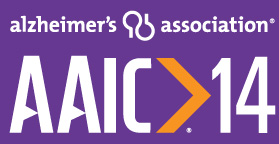New Research from the Alzheimer’s Association International Conference
 The Alzheimer’s Association International Conference (AAIC) is the world’s largest gathering of leading researchers from around the world focused on Alzheimer’s and other dementias. Held in Copenhagen, AAIC 2014 brought together approximately 4,000 leading experts and researchers from 75 countries around the world, and featured more than 1,700 scientific presentations. Following is a summary of a few research highlights from the event:
The Alzheimer’s Association International Conference (AAIC) is the world’s largest gathering of leading researchers from around the world focused on Alzheimer’s and other dementias. Held in Copenhagen, AAIC 2014 brought together approximately 4,000 leading experts and researchers from 75 countries around the world, and featured more than 1,700 scientific presentations. Following is a summary of a few research highlights from the event:
Potential for smell and eye tests in early detection of Alzheimer’s
Two studies provided increasing evidence that the inability to correctly identify odors may indicate the development of cognitive impairment and Alzheimer’s disease. Researchers in one study found that loss of brain cell function and worsened memory were associated with smell identification ability. Another study found that odor identification deficits were linked with an increased risk of transition from mild cognitive impairment (MCI) to Alzheimer’s disease.
Two additional studies looked at possible eye tests to detect Alzheimer’s. Preliminary results from one study suggest that there is a significant association between the level of beta-amyloid protein, the main component of Alzheimer’s brain “plaques,” in the brain and levels detected in the retina. In another study, researchers compared amyloid levels based on an eye lens test to amyloid plaque buildup estimates from brain positron emission tomography (PET) scans and were able to accurately differentiate those with Alzheimer’s disease from those without it.
Largest study of brain tau PET imaging suggests scans’ ability for early detection of dementia
Using a newly developed PET scan technology to “see” tau in the brains of living people, scientists found that study participants with higher levels of tau buildup in areas of the brain important to memory performed worse on memory tests over three years. The Alzheimer’s Association says the findings demonstrate the potential value of tau PET scans in early detection of dementia and in identifying participants for Alzheimer’s and dementia research studies.
Lifestyle interventions may improve memory and thinking in middle-age and older adults
A two-year randomized controlled clinical trial showed that people who received nutritional guidance, physical exercise, cognitive training, social activities and management of heart health risk factors performed significantly better on a comprehensive scale of memory and thinking, and on specific tests of memory and executive function compared with people who received only regular health advice.
In a separate study, researchers found that participants who self-reported a higher levels of mental stimulation – such as reading, visiting museums, playing games like puzzles and cards – had higher test scores for memory and thinking challenges, such as planning, judgment and problem-solving. They also had greater volume in several brain regions involved in Alzheimer’s disease.
Exercise in mid- and late-life associated with decreased risk of dementia
Two studies reported evidence that regular physical activity may reduce the risk of Alzheimer’s and other dementias. In one study, researchers found that a history of moderate physical exercise in middle age was associated with a significantly decreased risk of mild cognitive impairment (MCI). In a second study, researchers found that light physical exercise in mid-life and late-life was associated with a decreased risk of MCI, as was vigorous physical exercise in mid-life and moderate physical exercise in late-life.
Late-onset high blood pressure could protect against dementia
While hypertension during midlife may increase risk for Alzheimer’s and other dementias, there is emerging evidence that its association with dementia risk may change over time, and may instead help protect against dementia in people age 90 and over. Researchers followed older adults in the U.S. without dementia for up to 10 years and found that those with the onset of high blood pressure at age 80 to 89 had a significantly lower risk of developing dementia compared with participants with no history of high blood pressure. Those with the onset of hypertension at age 90 or older had even lower dementia risk.
Psychological intervention for caregivers may reduce anxiety and depression
A randomized controlled trial in the U.K. found that an eight-week psychological support program for family caregivers of people with dementia significantly reduced caregivers’ anxiety and depression, and the impact lasted for two years. The support program included education about dementia, caregiver stress and where to get emotional support, and techniques for dealing with caregiving challenges
Diabetes drug associated with reduced risk of dementia
A study of a large German database of people age 60 or older who were free of Alzheimer’s and others dementias found that long-term use of the diabetes drug pioglitazone may reduce incidence of dementia. Researchers at AAIC 2014 presented the study, which examined more 145,712 subjects over six years. Results suggest that reduced risk of dementia was significantly associated with use of pioglitazone. Researchers noted one possible theory is the drug’s ability to suppress neuroinflammation.
Additional abnormal protein, TDP-43, found in brains of people with Alzheimer’s
Researchers identified that an abnormal protein, known as TDP-43, may play an important role in Alzheimer’s disease along with two previously identified proteins. Researchers examined the brains of 342 people identified after death as having Alzheimer’s-related changes for the presence, amount and distribution of TDP-43. More than half the brains had TDP-43. In addition, people with TDP-43 were ten times more likely to have been cognitively impaired at death than subjects without it. The scientists speculate that TDP-43 may help explain why some people have Alzheimer’s changes in their brain, but do not experience dementia.
Helpful information related to this story
Read more articles by Dr. Edgerly
Read all about the latest Alzheimer’s research
Read about the latest findings from the Alzheimer’s Association International Conference
Meet more Alzheimer’s scientists


















I have increasing problems remembering things and I want to be proactive and do things to heal my brain and prevent further damage. I have been diagnosed with lacunar infarctions and now have some placque in a blood vessel in my brain. I want to eat foods that will help heal and prevent and do other things that will help to prevent/hold back alzheimers as much as possible.